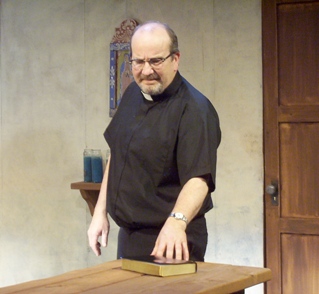It’s a popular formula that’s been employed since Boccaccio’s Decameron: A handful of travelers are consigned by pestilence or other threat to each other’s company, and storytelling commences. In Pulitzer-winner Lanford Wilson’s rarely performed Angels Fall, which flopped back in 1982, the travelers are two May/October couples stranded at a tiny New Mexico parish during a nearby nuclear accident.
Into the cool adobe sanctuary of Michael Mowery’s mission-style set barge ailing art-history professor Niles Harris (the decorously-poised-until-he’s-not Todd Jefferson Moore) and his much younger wife Vita. As Vita, Alyson Scadron Branner seems stilted and nervous at first, until it becomes clear that her character a) was the punctilious student who nabbed the prof, and b) is in way over her head in dealing with Niles’ health problems (he’s “recuperating from a traumatic nervous breakthrough”). They’re soon joined by middle-aged socialite Marion Clay (Teri Lazzara) and her phobic young tennis-star boytoy Zappy (Jason Sharp), who are clenched in a weirdly maternal/filial dynamic. Sharp’s paranoid, tripwire Zappy seems the very reason sports psychiatry was invented, to which Lazzara’s seen-it-all calm is the perfect foil.
All have their stories to tell, but Rob Burgess as the neurotically upbeat Father Doherty gives the performance of the evening, deadpanning zingers of resignation accompanied by bizarrely flapping extremities. He desperately wants his surly Native American foster son Don (Jose Abaoag), a medical student, to remain on the reservation where he can help his people, whereas Don sees his own future in the more productive and glamorous world of medical research. To keep himself going, Doherty sings pointed variations on folk songs, and reduces his religious ablutions at the altar to “Just give me the usual.”
The rift between him and Don serves as the center for the characters’ otherwise far-ranging discussion. Unfortunately, neither the script nor Julie Beckman’s prosaic direction gives the usually compelling Abaoag much to do other than scowl churlishly, until the climax when his medical smarts are called upon in a thoroughly contrived way. Still, the central conflict lends some heft to what might otherwise be a Love Boat ending—cruise over, all depart having resolved something.
Compared to OAT’s most recent production, Sam Shepard’s creepy, edgy Eyes for Consuela, this is pretty conventional middlebrow fare, marbled with humor. Apparently Wilson himself felt a bit sheepish about this script. He wrote it under the gun to fulfill a work contract, and the personal conviction that blazes consistently throughout his well-known Talley trilogy flashes only intermittently here. Except as the premise to throw them together, the inconvenience that closed the road, the uranium spill barely registers among any of the characters—though Melinda Short’s lighting and Jay Weinland and Rob Witmer’s sound do gamely evoke hovering chopper propellers a few times.
Plot drift and narrative flab notwithstanding, the acting is a pleasure to watch. The three older characters—Niles, Marion, and Father D—feel like complex, fully formed beings with whom being stuck in an elevator (or snowbound, or taken hostage) might actually be a rewarding experience.








